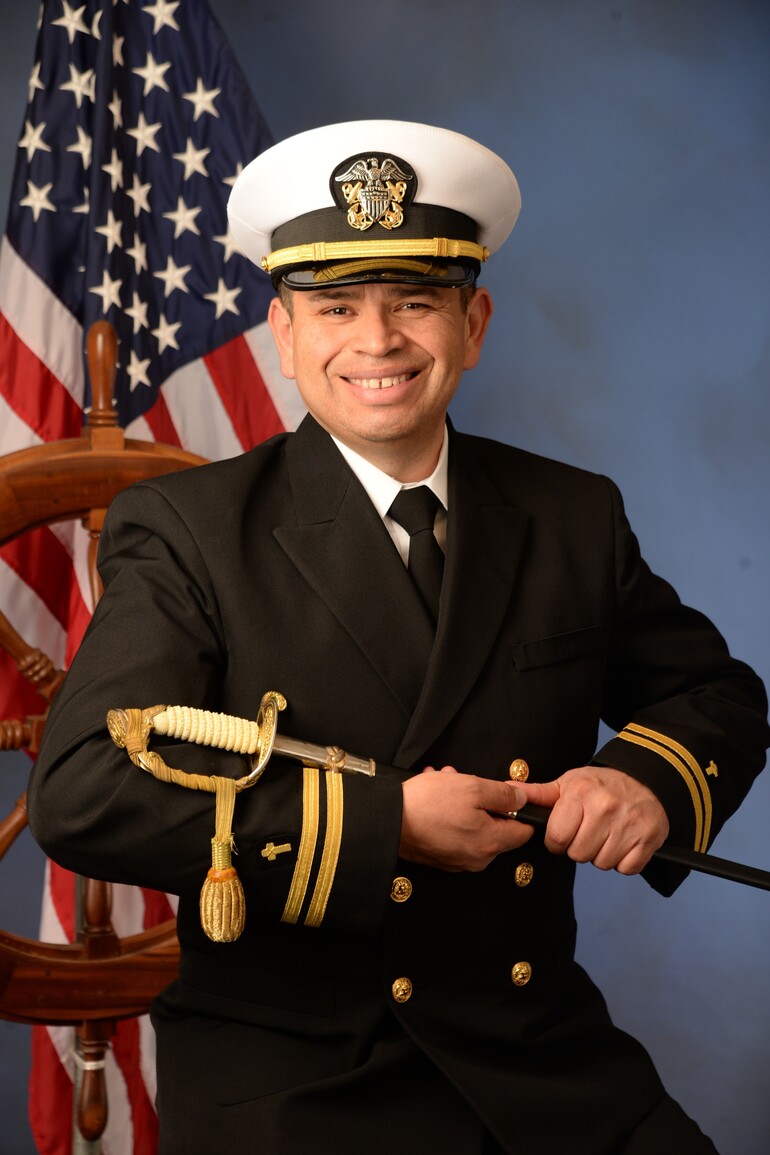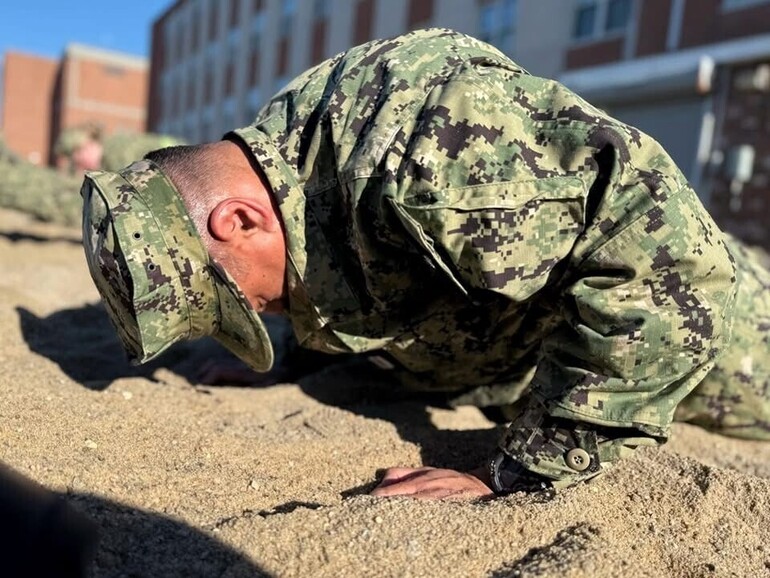Amid the noise and chaos of daily life, it can be hard to know when to speak up and when to stay silent. Sometimes, a single question or action can reveal the power of your voice. This story isn’t just about military training or personal mistakes. It’s about discovering how to find your voice amid chaos — and how that voice can speak for something greater than yourself.
When I signed up for officer development training with the U.S. Navy chaplaincy, I expected it to be intense, but nothing quite prepared me for what I was stepping into. I arrived in Rhode Island to find I was likely the oldest person in my cohort by at least two decades. Within hours, reality sank in. I thought, what have I gotten myself into?
For the next five weeks, I trained alongside nearly 180 sailors and chaplain candidates — men and women in their 20s and 30s, most of them just starting their careers. Every day was structured; every moment was accounted for. Civilian clothes were packed away. Uniforms became our daily identity. Marching drills brought back memories from my Pathfinder days — only this time, the stakes were higher and the pace was faster.
But something remarkable happened during those weeks. Through early mornings, intense physical demands and spiritual challenges, I was reminded that this calling — as a Christian, chaplain and follower of Jesus — isn’t just about holding a position, it’s about showing up, being present, being different and being consistent in faith. Somewhere between the drill deck and the classroom, God made that message clear.
One of the most physically and mentally demanding parts of our training was a three-hour simulation exercise called FENIX. Designed to mimic the chaos of a battlefield scenario, the drill tested how we would respond to emergencies under pressure. We rotated through stations that required quick thinking, teamwork and endurance. It was intense but incredibly meaningful.
The training pushed us all, regardless of age, and we leaned on each other for strength. With God’s help, I found the endurance to carry both physical and spiritual weight, proving that age doesn’t limit our resilience.
One moment that caught us off guard was the sudden 90-minute sandpit workout. The heat, sand and even the goose poop made it brutal, but in that chaos, we didn’t just endure, we grew in grit, character and dependence on something greater than ourselves.
Conditions were grueling — long hours with little sleep, extreme cold and basic life skills that some recruits had never learned. Despite it all, we grew, both individually and as a team, finding strength even in the most challenging moments.

Jose G. Galvez is a U.S. Navy chaplain and serves as a pastor in Oregon Conference for the Stayton, Silverton and Molalla district.
The Power of Speaking Up
As I reflect on my time in training, I’m reminded of an important principle that applies both in the military and in everyday life: the power of speaking up and being heard. One of the key lessons I took away was the importance of using your voice, not just for personal expression, but to build others up.
This brings to mind 1 Cor. 14:10, which says, “There are, it may be, so many kinds of languages in the world, and none of them is without significance.” While this passage is often linked to the gift of tongues, its deeper message is about breaking down language barriers to share God’s message. The gift of tongues was not about ecstatic, unintelligible speech, but about helping believers understand one another, fostering unity and building up the church.
Similarly, in our lives today, we’re called to use our voices — not just to speak, but to share messages that build understanding and encourage others. Language matters. Your voice matters.
Have you ever cringed at the sound of your own voice? Most of us do. We hear a recording and think, “Is that really what I sound like?” It’s uncomfortable because we’re not used to hearing ourselves the way others hear us. For many, staying quiet feels safer than speaking up.
Speaking Up Comes With a Cost
After an intense hour and a half of physical training — where some were crying and a couple were even rushed to the emergency room — I asked what everyone else was thinking but was too afraid to say: "Sir, what did we just do?"
In that moment, my desire to understand outweighed the consequences of speaking out. It was an unfiltered question, one that revealed my lack of discernment. The 60 push-ups I did as punishment were the least of the lesson. What I really learned was the importance of speaking with wisdom — knowing when and how to speak in a way that builds up rather than divides.
As I finished my punishment and stood up, I was stunned to see that all 33 members of my group had joined me in the pit. One guy, even in a walking boot due to injury, refused to leave. When the senior chief told him to get out, he simply said, "I’m not leaving my chaplain alone."
That moment stuck with me. I learned that sometimes speaking up comes with a cost, but it can also inspire others to stand with you.

Jose G. Galvez, Stayton, Silverton and Molalla district pastor, does 60 push-ups in the sandpit as a consequence during officer development training with U.S. Navy chaplaincy.
Many Voices, One Message
There are questions you don't ask — you go along, learn and grow. That's the challenge of using your voice. In a world of noise, it’s hard to know when to speak and what to say.
During training, we were often woken at 3:30 a.m. or 4 a.m. to shouting orders and urgency. It felt like trying to find your footing in chaos, much like the world today.
Voices surround us: political, religious, cultural and the cries of human need. And then, there’s the voice of sin, disguised as acceptance and even celebrated.
In all this noise, how do we, as followers of Jesus, cut through the chaos and make an impact with our voice?
I learned this lesson during my training. After asking a question I shouldn’t have, I owned my mistake and spent the next three weeks paying closer attention. I learned when to stay quiet and when to speak. When I did speak, I made sure my voice counted — not loud, but clear, consistent and heard.
On the final day, as we were being evaluated as leaders, I volunteered. The instructor looked at me and said, “I need someone who hasn’t spoken yet. Step aside.”
That moment wasn’t about volume, it was about resonance. My actions and words, without realizing it, were already established and known.
Your voice doesn’t have to be loud, but it must be clear and consistent.
Rom. 10:10–16 reminds us of the power and responsibility of using our voice:
“For it is with your heart that you believe and are justified, and it is with your mouth that you profess your faith and are saved ... For there is no difference between Jew and Gentile — the same Lord is Lord of all and richly blesses all who call on Him, for, ‘Everyone who calls on the name of the Lord will be saved.’
How, then, can they call on the one they have not believed in? And how can they believe in the one of whom they have not heard? And how can they hear without someone preaching to them? And how can anyone preach unless they are sent? As it is written: ‘How beautiful are the feet of those who bring good news!’
But not all the Israelites accepted the good news. For Isaiah says, ‘Lord, who has believed our message?’”
The word “preach” here isn’t reserved for pastors or chaplains. It refers to every believer — each of us is called to be a voice for the gospel. But that calling also requires discernment. It’s not just about speaking; it’s about knowing when and how to speak. The gospel is proclaimed not only through our words but also through the way we live — with consistency, integrity and a sensitivity to God’s timing.
Our world is filled with many loud voices. We don’t need to be the loudest; we just need to be consistent and discerning.
The cross we carry isn’t just pinned to our collar or engraved in our Bibles; it’s in our daily walk. Discernment helps us know when to speak with clarity and confidence and when to quietly show the gospel through our presence and love.
When others hear our voice — whether quiet or confident — it should be the voice of Christ they hear. The call isn’t just to speak, but to live in a way that the message of Christ is unmistakable. Discernment means understanding that our actions and words should align, that the message we carry should always point others to Him.
When someone hears, they can believe. And when they believe, they too will speak and the ripple of faith continues.
Let your voice be heard — not for attention, but for transformation, not for noise, but for the good news.
Discernment isn’t just about timing; it’s about knowing the weight of the words you speak and ensuring they reflect Christ’s love and truth.
Discernment in our voice means choosing words that lead to understanding, healing, and action. Someone out there is waiting to believe, and the way we speak could be the bridge to their faith.
Editor's Note: This perspective piece was adapted from a sermon, shared with permission and prayerfully packaged for our readers. We’re grateful for the many ways pastors are speaking into the lives of their congregations — and we believe their messages can ripple far beyond the pulpit. If you’re a pastor with a sermon or story that could encourage and inspire others here in the Pacific Northwest and beyond, the NWAdventists team would love to hear from you. Your words might be just what someone needs to read.







